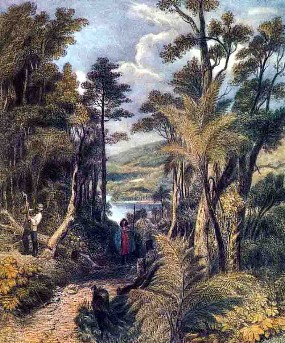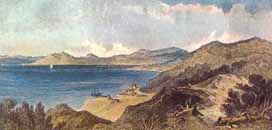Roads are as necessary to develop the resources of an agricultural district as the plough, or any other implement of farming husbandry. They are the great civilizers of a country. In the means of internal communication, New Zealand is, from its rugged character, naturally deficient. This defect the Company has partly obviated by the construction of ten miles of cart road and fourteen miles of bridle path. But the necessity of similar works, and the impossibility of the settlement making any great progress without them, is thus set forth in the following extracts from the Colonist paper :
 |
"Effect of no Roads, - Our readers may remember a flaming paragraph inserted in the Gazette about six months ago, on the profit of growing potatoes on the Hutt; they yielded, we were told, from ten to fifteen tons the acre, and "some" were sold at fifteen pounds the ton. The whole was concluded with a strong recommendation from the editor to "face the bush" and reap a similar harvest. All this might have been true, but that it was a most extraordinary instance of success, and should not have been held up as all example, the following facts will testify. No later than last month four acres of potatoes, in Mr. Wicksteed's section, were sold on the ground for the sum total of six pounds! The crop was not a fine one, but the potatoes were fully as large as those usually sold by the Maories, and there were from five to six tons to the acre, that is to say, in all about twenty tons, which thus fetched six shillings per ton! The purchaser urged he could not give more, since the expense of bringing them to Wellington would be twice as much as their original cost. This, no more than the former instance, should not be taken as a fair average of profit or loss, but it serves to show that without the easy means of conveying produce to market, the Hutt is of no use to us as an agricultural district. Communicated. |
"But there are still two things requisite for the realization of these advantages - to procure the acquiescence of the natives, and to construct roads. The former, we trust, will be now speedily accomplished; for the latter, we fear the settlers must wait a long time. Until, however, the means of communication have been provided, it is matter of comparative unimportance that a person should be able to look upon a map, and put his finger upon a piece of ground which he may call his own, but which he can turn to no profitable purpose. Roads are the great want of the Colony. Without them we can do little more than form a small settlement round the shores of this harbour. With them we may hope to develop, to their fullest extent, the yet untried resources of the country. (footnote 1)
A great number of the residents in this neighbourhood are the owners of sections of land which possess every element of value but accessibility but which, wanting this, are utterly worthless for all purposes of utility. The Karori, the Makara, and the Ohario districts are all in this predicament, as is also the greater part of the Hutt district. In this last district, indeed, there are many sections of which, unless we are strangely misinformed, not one boundary line ever has been traced. There is not even a surveyor's line by which they can be approached. The greater portion of the Manewatu and Orewenua districts are also useless for want of means of communication. (footnote 2)
This brings us to the main question. If the valley of the Hutt is to become an agricultural district, at whose expense is the river to be cleared and a road constructed? I shall not at present agitate the question whether the Company are bound to make their lands accessible or not ; I can safely say that the settlers are entirely without the means. This inability partly originates in the exhausted state of our finances, and partly in that incubus which presses upon the colony generally, that useless and dronish body the absentee landlords. In order to bring the forest into thorough cultivation, we must expend from £16 to £55 or £60 upon every acre, and with what results! How then can we be expected to construct roads and clear out rivers? The Company have been, and still are, employing surplus labourers in making roads to various districts, as Karori and Porirua. Yet what are these, in comparison to the Hutt, but mere cottage gardens - isolated patches, surrounded by mountains, over which roads can only be constructed at an enormous expense. I may be wrong in this opinion, but as no one pretends to put these districts in comparison with the Hutt, so do I humbly conceive it would be far better to concentrate all the assistance the Company can give us upon that district, which is confessedly the most valuable in the colony, and without which we can never grow our own food.
We confess that we see no reason for imagining that the Government will undertake the performance of such a task, simply for the reason that the fund which, in other parts of the colony, is specifically devoted to the construction of roads, and the maintenance of internal communications is, within the, New Zealand Company's territories, absorbed by that Company."
(footnote 3)
Next chapter.......
Footnote
1. October 21, 1842
2. August 9 1842
3. Swainson, On the Present Sate of the Colony
|


